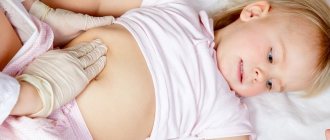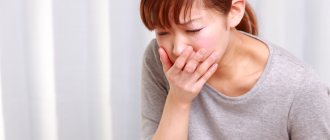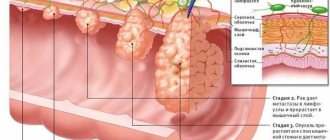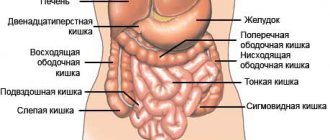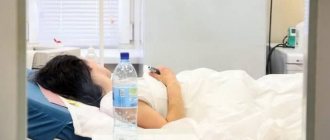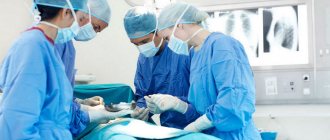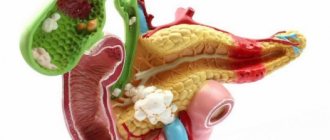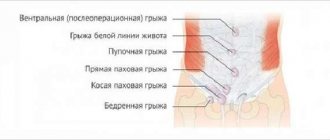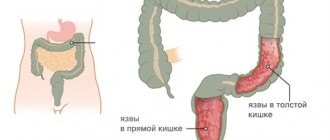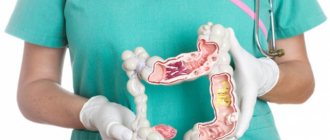With normal intestinal function, a person does not experience problems with digestion, and he always feels good and is in a good mood. However, if you have problems with the intestines, there are products that help enhance intestinal peristalsis and thereby help the organ normalize its activity. What are these foods and how should they be consumed to avoid discomfort and abdominal pain?
Knowing the properties of certain products, you can easily stimulate the intestines by using them in your diet.
- 2.1 Diet No. 3
What is peristalsis
To understand what the problem is, you need to understand what peristalsis is. Peristalsis is the contraction of the hollow organs of the digestive system: the stomach and intestines. The speed of wave-like contractions is not the same:
- The duodenum contracts the fastest (about 12 contractions per minute);
- slowest - in the stomach and rectum - about 3 times per minute.
The purpose of peristalsis is to move the bolus of food (chyme) along the entire digestive system from the moment of swallowing food to defecation. Maintaining the correct speed of food digestion ensures comfortable digestion, which a person does not feel or hear.
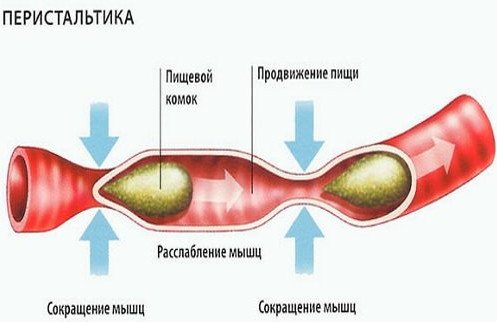
If the rate of contraction of the gastrointestinal tract organs decreases, the intestinal contents (chyme) move slowly, the processes of putrefaction begin to prevail over fermentation, and corresponding symptoms develop.
But a logical question arises: is increased intestinal motility a pathology, that is, an excess of the normal rate of contraction of the cavities of the digestive system, and does it require treatment? You can find the answer to it by finding out the etiology of the process and the clinical picture against the background of the phenomenon.
Treatment in children
To stabilize intestinal motility in newborns, you can:
- In case of breastfeeding, the mother should reconsider her diet, reduce or eliminate the consumption of meat, flour products and sweets. If possible, give your baby a little extra water.
- If artificial feeding is practiced, use a high-quality adapted milk formula.
- If mixed, cancel the early introduction of protein products (meat) into the diet.
If diet adjustments do not help, contact a pediatrician who will clarify the diagnosis and prescribe appropriate treatment. These are lactulose preparations, glycerin suppositories.
Therapy for children after the first year of life consists of following a diet (foods with dietary fiber and fermented milk). May be prescribed for treatment:
- Probiotics.
- Medicines containing lactulose (Duphalac) and stool thinners (Macrogol, Tranzipeg, Forlax).
- Antispasmodics and normotonics (Mebeverine, Trimebutine).
- Microclysters (Microlax).
Reasons for increased peristalsis
The etiology of increased intestinal motility or the reasons that lead to this deviation from the norm is varied: it includes both external and internal factors.
- The most common reason for accelerated peristalsis is poor nutrition. We can talk about (spoiled, expired) products or fast food, instant food. Depending on the individual characteristics of the human body, the pathological process is caused by fatty and high-calorie foods.
If we consider the process as simplified as possible, we can say that “unhealthy” food, objectively or from the point of view of a particular organism, provokes fermentation processes, so the intestines begin to contract faster.
Products
To normalize the dynamic functioning of the gastrointestinal tract, it is necessary to adhere to a certain diet. List of allowed and undesirable products:
| Improves peristalsis | Worsening peristalsis |
|
|
We recommend reading:
Causes of profuse (liquid) diarrhea and methods of its treatment
Symptoms of increased intestinal motility
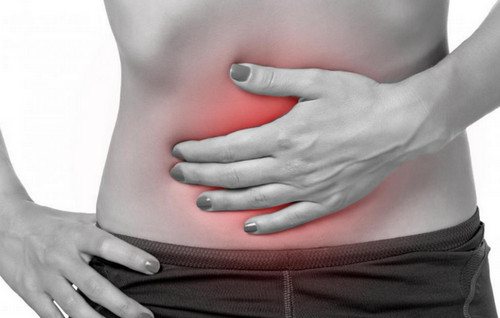
The symptoms of hyperperistalsis are similar to those of an intestinal disorder. A person experiences the following discomfort:
- pain in the epigastric region of varying severity;
- bloating, flatulence;
- frequent stools (not necessarily loose);
- bowel dysfunction: diarrhea most often occurs, but sometimes constipation may develop;
- decreased overall tone due to constant discomfort;
- changes in body weight due to malabsorption of nutrients.
It is noteworthy that pain, bloating and rumbling in the abdomen begin immediately after eating, even before the chyme enters the intestines. The fact is that intestinal contractions begin not from the moment food enters it, but from the moment the meal begins.
At an early stage of pathology development, a person may ignore the symptoms, since they are not too pronounced. But gradually a person’s well-being deteriorates, the constant process of fermentation in the intestines provokes intoxication of the body, due to insufficient absorption of vitamins and microelements, vitamin deficiency and various pathologies develop.
Treatment
Violation of peristalsis can cause constipation in the patient with the release of rather dense feces in the form of a thin ribbon or sheep feces. This indicates stool dehydration due to a lack of water in your body. In order for the intestines to function smoothly, it is necessary, first of all, to regulate the water balance and its metabolism in the body. At the same time, it should be taken into account that you need not only to drink enough water every day, but also to be able to hold it, so that your peristalsis is always complete.
Bowel preparations
How to enhance intestinal motility with drugs. For this, laxatives are used. With their help, peristalsis is enhanced and emptying is accelerated. Today there are a huge number of different laxative drugs that affect different parts of the organ. There are medications for peristalsis:
acting on the entire intestine.
to the small intestine.
to the colon.
Such drugs can be of either synthetic or natural origin.
Products to enhance peristalsis
First, carefully monitor your daily diet. The intestines are very susceptible to toxins that are constantly formed from leftover food that has not been digested. Minimize, and preferably completely eliminate, fatty and oil-fried dishes from your menu, and together with them – canned food, smoked foods, refined sugar, baked goods, alcohol and carbonated drinks. Eat cereals, greens, nuts, rolled oats, bran, vegetables, and fruits every day. Make it a healthy habit to drink a glass of kefir on the eve of sleep.
Food will help enhance peristalsis if you chew it very thoroughly, ideally until it turns into a liquid paste. You should never drink solid food with water, and you should also not do this with other liquid foods (juices, compotes, tea). You can drink liquids no earlier than an hour after a meal. It is much healthier and correct to drink water before meals than after.
Drink plenty of plain mineral water (still). During the day, the total amount of liquid you consume (including soups and teas) should be at least eight glasses.
How to improve peristalsis using folk remedies?
You will need the following two sets of components:
- dried apricots, honey, hay grass, prunes, propolis tincture (20%);
- rose hips, beets, raisins, orange peels, lemon, black currants, cranberries, lingonberries, blueberries, prunes, vegetable oil, dried apricots, salt, honey.
Take 400 grams of dried apricots and the same amount of prunes, remove the seeds from the latter. Grind the components using a meat grinder, and then add a pack of this hay to the mixture, along with 2 tablespoons of 20% propolis tincture and an incomplete glass (200 g) of liquid honey (necessarily natural). Mix everything. Peristalsis will improve if you take a couple of teaspoons for dinner during the evening meal, washing it down with tea or warm water.
You can enhance peristalsis in case of intestinal problems with the help of beet balm. The preparation method is the same as for any other similar product and storage is also quite simple - in a closed container in the refrigerator. To prepare it, take:
- 2 kg beets;
- 1 tsp rosehip;
- a small amount of orange peels,
- lemon wedge along with zest,
- enhances peristalsis with a mixture of lingonberries, black currants, blueberries, cranberries (about 5 tablespoons in total) - frozen berries can be used.
- a quarter cup of raisins,
- strengthen motor skills prunes and dried apricots - 10 pieces each,
- 4 tablespoons vegetable oil (unrefined),
- a teaspoon of salt,
- a tablespoon of fresh honey.
Antibiotics and antimicrobials
Antibacterial drugs act on pathogenic microorganisms, suppressing their growth and numbers. May cause allergies. It is highly undesirable to take them without a doctor's prescription. List of popular antibiotics for diarrhea:
- "Fthalazol". White or light yellow tablets with the active ingredient phthalylsulfathiazole. For adults, the maximum daily dose is 7 g. On the first day, it should be divided into 6 doses, after which the dosage and amount of the drug should be reduced to 1 g 3-4 times a day. The approximate cost of 10 tablets is 27 rubles.
- "Nifuroxazide" ("Lekor", "Stopdiar", "Enterofuril", "Nifuroxazide"). The active substance is nifuroxazide. The medicine is available both in capsules and in suspension. An adult can take up to 800 mg of nifuroxazide per day (5 ml of suspension or 1 capsule of 200 mg 4 times a day). The price of the drug ranges from 140 to 500 rubles.
- "Nystatin" Tablets with the same active ingredient. They should be taken an hour before meals, a maximum of 12 tablets per day (4,000,000–6,000,000 units), divided into 4 doses. The approximate price for 100 tablets is 130 rubles.
- "Alpha Normix". The medicine comes in the form of granules that need to be diluted with water or tablets. The active substance is rifaximin. Its maximum daily dose is 1200 mg, which corresponds to three doses of 20 ml of oral suspension (2 tablets). The break between doses of the drug is at least 8 hours. "Alpha Normix" is quite expensive: 12 tablets cost from 700 rubles and more.
It is important to understand that when you have diarrhea, it is not enough to take a “stomach pill.” You still need to replenish lost fluid. The optimal amount of water to drink per day is 2 liters. You can also use special preparations for oral rehydration (Regidron, Gastrolit). Until the diarrhea stops, you need to follow a special diet. On the first day, it is best to drink rice water, tea and eat wheat crackers.
In what cases should you call an ambulance?
Very often, diarrhea is a completely natural reaction of the body to poor quality food or dietary irregularities. If in an adult it lasts no more than a day, and the general health is normal, then treatment can be done at home. However, in cases where diarrhea becomes chronic or is accompanied by a significant deterioration in health, you cannot do without a doctor. Sometimes diarrhea can be a symptom of a dangerous disease, and then you cannot hesitate.
It is necessary to call an ambulance in the following cases:
- for diarrhea in a child under 1 year of age;
- if the patient has an elevated body temperature;
- diarrhea accompanied by vomiting;
- despite taking sorbents, diarrhea continues for more than a day;
- the stomach hurts very much;
- there is mucus, greens, and blood (black) in the stool.
